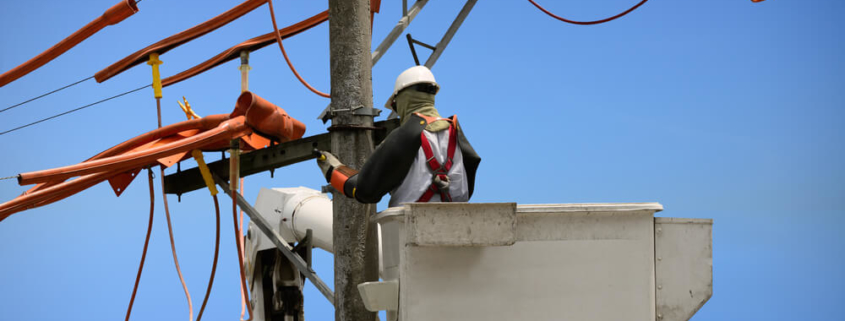The Hazards of Working as a Power Lineman after a Hurricane
It’s hurricane season again, and with that comes wind, rain and destruction. The devastation caused by these tropical systems can be measured in many ways: the loss of human lives, the toll the storms take on first responders, the financial impact of recovering from the storm and the hard work of those responsible for helping local communities return to life before storm. The remnants of these storms have been known to cause high winds and heavy rainfall; resulting in mass flooding, power outages, and similar hazards. Enduring a hurricane and its aftermath is hard enough but having to go out and work in the midst of the storm takes exceptional bravery and courage.
Most of us stay inside and hunker down during a major storm, but a few brave souls are called upon to help keep order, tend to those who are hurt, and repair the damage. These include law enforcement and military personnel, firefighters, emergency medical personnel, and power linemen/electrical workers. Even on a clear and sunny day, the job of a power lineman is extremely dangerous. When you add heavy rain, floods, downed lines, and downed trees tangled with the power lines to the mix, the hazards of this job are multiplied exponentially.
There are several extreme hazards power linemen face when working after a hurricane. These include:
Poor Driving Conditions
During and after a hurricane, utility workers often have to deal with heavy rains and flooding, causing slippery and hazardous roadways. As a side note, power linemen in Appalachia have to deal with snow and ice sometimes too, particularly when the remnant of the storm hits some of the higher elevations. Pressure to move quickly to and from downed power lines makes things worse and can result in motor vehicle accidents with severe injuries and fatalities.
Slips and Falls
Working in high elevations makes power linemen susceptible to serious falls during the normal course of work. When you add wet, slippery, or even icy and snowy conditions, the dangers of slipping and falling are vastly increased. There is also a greater danger of falling on slippery walkways even when they are on the ground.
Falling Objects
Downed lines, downed trees, and nearby structures that may be damaged combine with high winds to put utility workers in the crosshairs of dangerous debris that may be blowing around. Being struck by hazardous objects can cause a worker to fall from a high place. But even if they are hit while on the ground, this type of incident can cause a serious injury. This makes it all the more important for power linemen to be mindful of their surroundings and wear the proper safety equipment at all times.
Burns and Explosions
When high voltage power lines are damaged, severed, and/or downed, there is a danger of explosions, fires, electrocution, and other hazards for those working to repair the lines. Again, having the appropriate safety and protective equipment is absolutely critical. It is also important that workers be properly trained to deal with these types of situations.
Stress from Long Hours
A major hurricane can cause thousands, even tens of thousands of consumers to be without power. Cleanup and power restoration can take weeks or months, and in some extreme cases, nearly a year. When this happens, a power lineman can expect to work long hours for an extended period of time. The stress of working massive amounts of overtime can wear on a body, making utility workers more susceptible to injuries and occupational illnesses.
Keeping Power Linemen Safe after a Hurricane
It is incumbent upon those who employ utility workers to take all legal and appropriate measures to ensure they are safe during and after major storms such as hurricanes. Unfortunately, these employers do not always put the safety of their workers first. When they fail to follow the law and take reasonable steps to ensure that their employees stay safe, they must be held accountable.
Power line workers have multiple potential legal options when they are injured on the job. The first step is to file a workers’ compensation claim. Beyond that, however, some states also allow you to sue your employer if their negligent actions placed the worker intentionally in harm’s way. If the injury resulted from a dangerous or defective product, or because of the negligent or reckless acts of a third party, they may be able to file a product liability lawsuit against a manufacturer, supplier, or distributor, or a third-party personal injury lawsuit.
If you or a loved one suffered severe injury or death while working as a power lineman or any other utility worker during a hurricane or another type of storm, it is important to understand your rights and options. As soon as possible, get in touch with a seasoned personal injury lawyer, preferably one who has specific experience with power lineman injury cases. These types of cases are highly complex and difficult to pursue, and you need a skilled attorney by your side who is able to explore all potential legal avenues toward recovering full compensation.
At Bailey, Javins, and Carter, we have several decades of experience representing workers injured in accidents resulting from another party’s negligence. We have been at the forefront of this area of the law for many years, and we have represented countless workers who perform dangerous jobs (such as power linemen). Our lawyers thoroughly understand the complexities of these types of cases, and we have the skills, resources, and dedication to successfully pursue full damages for our clients. If you or a loved one has been injured while helping others, please contact our office at (800) 497-0234 or through our website contact form.




